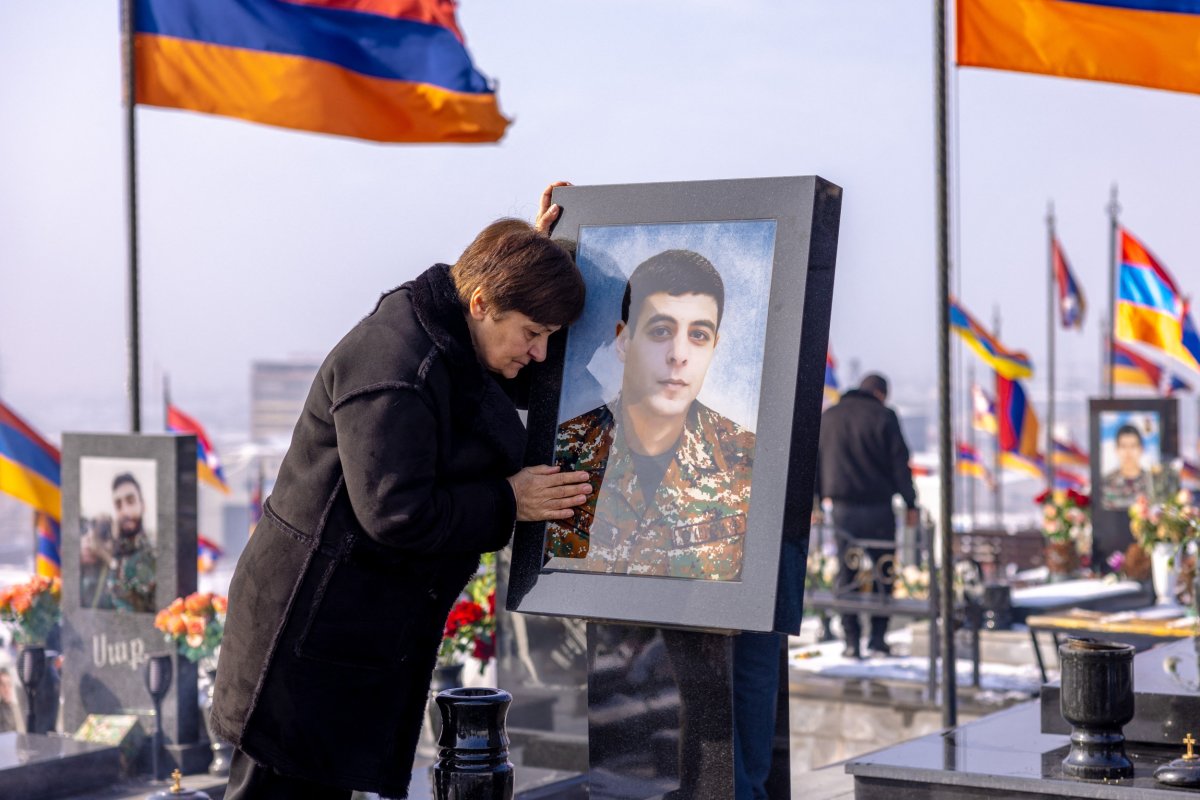Last September, the Amaras Monastery, one of Christianity's oldest religious complexes and a sacred site of the Armenian Apostolic Church, was seized by Azerbaijan as it invaded the self-governing Armenian enclave of Artsakh, widely known as Nagorno-Karabakh. The attack violated a 2020 agreement between Armenia, Azerbaijan, and Russia that ended an earlier war and quickly compelled the panicked flight of the enclave's 120,000 Armenians.
The exodus—which ended an almost 4,000-year-old continuous presence and one of the oldest Christian communities in the world—was one of the most effective genocides (ethnic cleansings) of recent times. It is a tragedy that 109 years after the start of the Armenian genocide by the Ottoman Turks—an event that is marked worldwide on April 24—Armenians are still under assault.
We at the Philadelphia-based Lemkin Institute for Genocide Prevention, whose mission is to prevent the recurrence of such evil, have watched with horror as Azeri soldiers have routinely commit atrocities against Armenian soldiers and civilians who fall into their clutches, including beheadings, mutilations, humiliations, and sexualized violence, often videotaped and shared to social media (see this detailed dossier compiled by the California-based Center for Truth and Justice, submitted to the International Criminal Court last week), and reportedly also forced conversions.
On this Armenian Genocide Remembrance Day, I'd like to underscore that genocidal regimes conduct their evil in many ways—and one of them is the effort to destroy a people's culture. While the human plight of the Artsakh Armenians is the most heartbreaking and relatable aspect of Azerbaijan's crimes, it is also attempting to erase and rewrite Armenian Christian history. And while cultural erasure and genocide are often treated as distinct legal concepts, cultural erasure can be a component or precursor to genocide in certain contexts.
That's why the Amaras Monastery is a potent symbol.
Founded at the beginning of the 4th century CE by St. Gregory the Illuminator, the evangelizer of Armenia, the Amaras Monastery is the burial place of his grandson St. Grigoris. In the 5th century, St. Mesrop Mashtots, who invented the Armenian alphabet, established his first school there. It is the jewel in a breathtaking array of Christian cultural heritage in the South Caucasus, and all that history is now threatened with erasure.
That's because the well-documented Armenophobia of Azerbaijan's President Ilham Aliyev, who was recently re-elected for a fifth term, goes far beyond hate speech. It has fueled the systematic destruction of Christian heritage in the region, a destruction that predates Aliyev's regime but that has reached its apogee under him.
Azerbaijan has a hideous record as overseer of Armenian Christian heritage that falls into its clutches. In the Azeri exclave of Nakhchivan, which at one time had a significant Armenian population but now has none, Azerbaijan has destroyed an estimated 98 percent of Armenian cultural heritage, including churches, cemeteries, and monasteries.
Azerbaijan in general denies the Armenian identity of area churches, cemeteries, and monasteries, ascribing them to a historical group called "Caucasian Albanians" to whom Azeris tie their own historical roots. Among other acts, Azerbaijan recently destroyed the Kanach Zham Church (the Green Church) in the city of Shushi (Susha to Azeris); it destroyed the 18th-19th century St. Sargis Armenian Church in the village of Susanlyg; Azerbaijan destroyed cemeteries dating back to the 9th century and disinterred bodies.
Azerbaijan's attitude is evident in its construction of what Armenians are convinced was an an internment facility for Armenian men near the border with Artsakh established after the 2020 war, in a secluded area near a 7th century church, and a 2,000-year-old Armenian archeological site.
Azerbaijan's aggressions violate not only international law but also a global value system that champions religious freedom.

Azeri forces filmed themselves shooting at the 13th-century Charektar Monastery, and after seizing the enclave last fall, the military dismantled the 164-feet cross structure that illuminated at night on a mountain overlooking Artsakh's capital Stepanakert, a gratuitous act that served no military purpose.
Azeri President Ilham Aliyev's view of Armenians is very similar to the pan-Turkic ideology of the Young Turks who annihilated the Armenian presence in the Ottoman Empire during World War I, when over a million Armenians were killed on lands where they had lived for millennia. Like the Young Turks, Aliyev expresses hatred for Armenians as an ethnoreligious group—an ancient people intimately tied to their Christian identity.
All the evidence suggests that Aliyev, who is strongly supported by Turkey and the Pan-Turkic dreams of its premier Recep Tayyip Erdogan, is still not done. He is now threatening to invade Armenia proper, which he refers to as "Western Azerbaijan."
Azerbaijan is responsible for egregious and systematic violations of religious freedoms, including ethnic cleansing—and arguably genocide—committed against Armenians. Its assault is an attack on democratic values, an affront to the concept of truth, and a gambit that the United States should decisively repel.
Failure to recognize Azerbaijan's true face will be interpreted as impunity to continue on this path. One only need to visit eastern Turkey, the historical homeland of Armenians, where former churches have been razed, lie in ruins, or are used for storage, to see what the results of inaction will be.
As Rabbi Hillel once asked, "If not now, then when? If not us, then who?"
Dr. Elisa von Joeden-Forgey is the executive director of the Philadelphia, Pa.-based Lemkin Institute for Genocide Prevention.
The views expressed in this article are the writer's own.
Update (4/24/24, 6:19 PM EST): The Green Church was recently destroyed by Azerbaijan.
Uncommon Knowledge
Newsweek is committed to challenging conventional wisdom and finding connections in the search for common ground.
Newsweek is committed to challenging conventional wisdom and finding connections in the search for common ground.
About the writer
To read how Newsweek uses AI as a newsroom tool, Click here.








